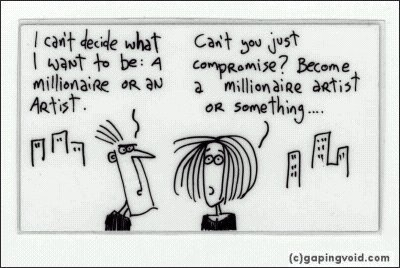How To Be Creative:
So you want to be more creative, in art, in business, whatever. Here are some tips that have worked for me over the years:
1. Ignore everybody.
2. The idea doesn't have to be big. It just has to be yours.
3. Put the hours in.
4. If your biz plan depends on you suddenly being "discovered" by some big shot, your plan will probably fail.
5. You are responsible for your own experience.
6. Everyone is born creative; everyone is given a box of crayons in kindergarten.
7. Keep your day job.
8. Companies that squelch creativity can no longer compete with companies that champion creativity.
9. Everybody has their own private Mount Everest they were put on this earth to climb.
10. The more talented somebody is, the less they need the props.
11. Don't try to stand out from the crowd; avoid crowds altogether.
12. If you accept the pain, it cannot hurt you.
13. Never compare your inside with somebody else's outside.
14. Dying young is overrated.
15. The most important thing a creative person can learn professionally is where to draw the red line that separates what you are willing to do, and what you are not.
16. The world is changing.
17. Merit can be bought. Passion can't.
18. Avoid the Watercooler Gang.
19. Sing in your own voice.
20. The choice of media is irrelevant.
21. Selling out is harder than it looks.
22. Nobody cares. Do it for yourself.
23. Worrying about "Commercial vs. Artistic" is a complete waste of time.
24. Don�t worry about finding inspiration. It comes eventually.
25. You have to find your own schtick.
26. Write from the heart.
27. The best way to get approval is not to need it.
28. Power is never given. Power is taken.
29. Whatever choice you make, The Devil gets his due eventually.
30. The hardest part of being creative is getting used to it.
31. Remain frugal.
32. Allow your work to age with you.
33. Being Poor Sucks.
34. Beware of turning hobbies into jobs.
35. Savor obscurity while it lasts.
36. Start blogging.
37. Meaning Scales, People Don't.
37. When your dreams become reality, they are no longer your dreams.
MORE:
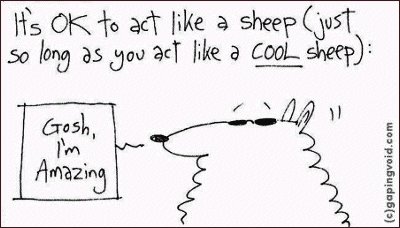
1. Ignore everybody.
The more original your idea is, the less good advice other people will be able to give you. When I first started with the cartoon-on-back-of-bizcard format, people thought I was nuts. Why wasn't I trying to do something more easy for markets to digest i.e. cutey-pie greeting cards or whatever?
You don't know if your idea is any good the moment it's created. Neither does anyone else. The most you can hope for is a strong gut feeling that it is. And trusting your feelings is not as easy as the optimists say it is. There's a reason why feelings scare us.
And asking close friends never works quite as well as you hope, either. It's not that they deliberately want to be unhelpful. It's just they don't know your world one millionth as well as you know your world, no matter how hard they try, no matter how hard you try to explain.
Plus a big idea will change you. Your friends may love you, but they don't want you to change. If you change, then their dynamic with you also changes. They like things the way they are, that's how they love you- the way you are, not the way you may become.
Ergo, they have no incentive to see you change. And they will be resistant to anything that catalyzes it. That's human nature. And you would do the same, if the shoe was on the other foot.
With business colleagues it's even worse. They're used to dealing with you in a certain way. They're used to having a certain level of control over the relationship. And they want whatever makes them more prosperous. Sure, they might prefer it if you prosper as well, but that's not their top priority.
If your idea is so good that it changes your dynamic enough to where you need them less, or God forbid, THE MARKET needs them less, then they're going to resist your idea every chance they can.
Again, that's human nature.
GOOD IDEAS ALTER THE POWER BALANCE IN RELATIONSHIPS, THAT IS WHY GOOD IDEAS ARE ALWAYS INITIALLY RESISTED.
Good ideas come with a heavy burden. Which is why so few people have them. So few people can handle it.

2. The idea doesn't have to be big. It just has to be yours.
The sovereignty you have over your work will inspire far more people than the actual content ever will.
We all spend a lot of time being impressed by folk we've never met. Somebody featured in the media who's got a big company, a big product, a big movie, a big bestseller. Whatever.
And we spend even more time trying unsuccessfully to keep up with them. Trying to start up our own companies, our own products, our own film projects, books and whatnot.
I'm as guilty as anyone. I tried lots of different things over the years, trying desperately to pry my career out of the jaws of mediocrity. Some to do with business, some to do with art etc.
One evening, after one false start too many, I just gave up. Sitting at a bar, feeling a bit burned out by work and life in general, I just started drawing on the back of business cards for no reason. I didn't really need a reason. I just did it because it was there, because it amused me in a kind of random, arbitrary way.
Of course it was stupid. Of course it was uncommercial. Of course it wasn't going to go anywhere. Of course it was a complete and utter waste of time. But in retrospect, it was this built-in futility that gave it its edge. Because it was the exact opposite of all the "Big Plans" my peers and I were used to making. It was so liberating not to have to be thinking about all that, for a change.
It was so liberating to be doing something that didn't have to impress anybody, for a change.
It was so liberating to be doing something that didn't have to have some sort of commercial angle, for a change.
It was so liberating to have something that belonged just to me and no one else, for a change.
It was so liberating to feel complete sovereignty, for a change. To feel complete freedom, for a change.
And of course, it was then, and only then, that the outside world started paying attention.
The sovereignty you have over your work will inspire far more people than the actual content ever will. How your own sovereignty inspires other people to find their own sovereignty, their own sense of freedom and possibility, will give the work far more power than the work's objective merits ever will.
Your idea doesn't have to be big. It just has to be yours alone. The more the idea is yours alone, the more freedom you have to do something really amazing.
The more amazing, the more people will click with your idea. The more people click with your idea, the more this little thing of yours will snowball into a big thing.
That's what doodling on business cards taught me.
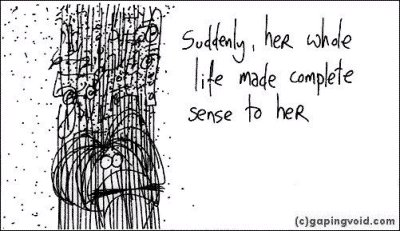
3. Put the hours in.
Doing anything worthwhile takes forever. 90% of what separates successful people and failed people is time, effort, and stamina.
I get asked a lot, "Your business card format is very simple. Aren't you worried about somebody ripping it off?"
Standard Answer: Only if they can draw more of them than me, better than me.
What gives the work its edge is the simple fact that I've spent years drawing them. I've drawn thousands. Tens of thousands of man hours.
So if somebody wants to rip my idea off, go ahead. If somebody wants to overtake me in the business card doodle wars, go ahead. You've got many long years in front of you. And unlike me, you won't be doing it for the joy of it. You'll be doing it for some self-loathing, ill-informed, lame-ass mercenary reason. So the years will be even longer and far, far more painful. Lucky you.
If somebody in your industry is more successful than you, it's probably because he works harder at it than you do. Sure, maybe he's more inherently talented, more adept at networking etc, but I don't consider that an excuse. Over time, that advantage counts for less and less. Which is why the world is full of highly talented, network-savvy, failed mediocrities.
So yeah, success means you've got a long road ahead of you, regardless. How do you best manage it?
Well, as I've written elsewhere, don't quit your day job. I didn't. I work every day at the office, same as any other regular schmoe. I have a long commute on the train, ergo that's when I do most of my drawing. When I was younger I drew mostly while sitting at a bar, but that got old.
The point is; an hour or two on the train is very managable for me. The fact I have a job means I don't feel pressured to do something market-friendly. Instead, I get to do whatever the hell I want. I get to do it for my own satisfaction. And I think that makes the work more powerful in the long run. It also makes it easier to carry on with it in a calm fashion, day-in-day out, and not go crazy in insane creative bursts brought on by money worries.
The day job, which I really like, gives me something productive and interesting to do among fellow adults. It gets me out of the house in the day time. If I were a professional cartoonist I'd just be chained to a drawing table at home all day, scribbling out a living in silence, interrupted only by freqent trips to the coffee shop. No, thank you.
Simply put, my method allows me to pace myself over the long haul, which is important.
Stamina is utterly important. And stamina is only possible if it's managed well. People think all they need to do is endure one crazy, intense, job-free creative burst and their dreams will come true. They are wrong, they are stupidly wrong.
Being good at anything is like figure skating- the definition of being good at it is being able to make it look easy. But it never is easy. Ever. That's what the stupidly wrong people coveniently forget.
If I was just starting out writing, say, a novel or a screenplay, or maybe starting up a new software company, I wouldn't try to quit my job in order to make this big, dramatic heroic-quest thing about it.
I would do something far simpler: I would find that extra hour or two in the day that belongs to nobody else but me, and I would make it productive. Put the hours in, do it for long enough and magical, life-transforming things happen eventually. Sure, that means less time watching TV, internet surfing, going out or whatever.
But who cares?
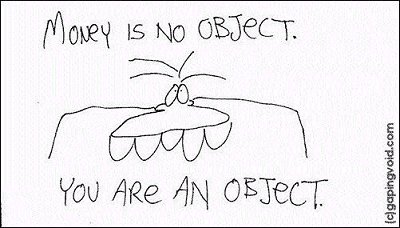
4. If your biz plan depends on you suddenly being "discovered" by some big shot, your plan will probably fail.
Nobody suddenly discovers anything. Things are made slowly and in pain.
I was offered a quite substantial publishing deal a year or two ago. Turned it down. The company sent me a contract. I looked it over. Hmmmm...
Called the company back. Asked for some clarifications on some points in the contract. Never heard back from them. The deal died.
This was a very respected company. You may have even heard of it.
They just assumed I must be just like all the other people they represent- hungry and desperate and willing to sign anything.
They wanted to own me, regardless of how good a job they did.
That's the thing about some big publishers. They want 110% from you, but they don't offer to do likewise in return. To them, the artist is just one more noodle in a big bowl of pasta.
Their business model is to basically throw the pasta against the wall, and see which one sticks. The ones that fall to the floor are just forgotten.
Publishers are just middlemen. That's all. If artists could remember that more often, they'd save themselves a lot of aggrevation.
Anyway, yeah, I can see gapingvoid being a 'product' one day. Books, T-shirts and whatnot. I think it could make a lot of money, if handled correctly. But I'm not afraid to walk away if I think the person offering it is full of hot air. I've already got my groove etc. Not to mention another career that's doing quite well, thank you.
I think "gapingvoid as product line" idea is pretty inevitable, down the road. Watch this space.
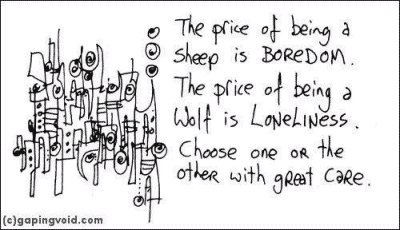
5. You are responsible for your own experience.
Nobody can tell you if what you're doing is good, meaningful or worthwhile. The more compelling the path, the more lonely it is.
Every creative person is looking for "The Big Idea". You know, the one that is going to catapult them out from the murky depths of obscurity and on to the highest planes of incandescent ludicity.
The one that's all love-at-first-sight with the Zeitgeist.
The one that's going to get them invited to all the right parties, metaphorical or otherwise.
So naturally you ask yourself, if and when you finally come up with The Big Idea, after years of toil, struggle and doubt, how do you know whether or not it is "The One"?
Answer: You don't.
There's no glorious swelling of existential triumph.
That's not what happens.
All you get is this rather kvetchy voice inside you that seems to say, "This is totally stupid.This is utterly moronic. This is a complete waste of time. I'm going to do it anyway."
And you go do it anyway.
Second-rate ideas like glorious swellings far more. Keeps them alive longer.
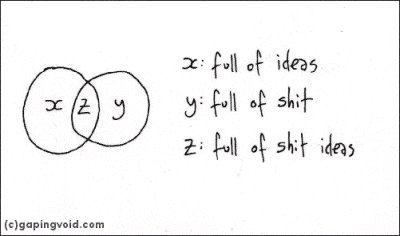
6. Everyone is born creative; everyone is given a box of crayons in kindergarten.Then when you hit puberty they take the crayons away and replace them with books on algebra etc. Being suddenly hit years later with the creative bug is just a wee voice telling you, "I�d like my crayons back, please."
So you've got the itch to do something. Write a screenplay, start a painting, write a book, turn your recipe for fudge brownies into a proper business, whatever. You don't know where the itch came from, it's almost like it just arrived on your doorstep, uninvited. Until now you were quite happy holding down a real job, being a regular person...
Until now.
You don't know if you're any good or not, but you'd think you could be. And the idea terrifies you. The problem is, even if you are good, you know nothing about this kind of business. You don't know any publishers or agents or all these fancy-shmancy kind of folk. You have a friend who's got a cousin in California who's into this kind of stuff, but you haven't talked to your friend for over two years...
Besides, if you write a book, what if you can't find a publisher? If you write a screenplay, what if you can't find a producer? And what if the producer turns out to be a crook? You've always worked hard your whole life, you'll be damned if you'll put all that effort into something if there ain't no pot of gold at the end of this dumb-ass rainbow...
Heh. That's not your wee voice asking for the crayons back. That's your outer voice, your adult voice, your boring & tedious voice trying to find a way to get the wee crayon voice to shut the hell up.
Your wee voice doesn't want you to sell something. Your wee voice wants you to make something. There's a big difference. Your wee voice doesn't give a damn about publishers or Hollywood producers.
Go ahead and make something. Make something really special. Make something amazing that will really blow the mind of anybody who sees it.
If you try to make something just to fit your uninformed view of some hypothetical market, you will fail. If you make something special and powerful and honest and true, you will succeed.
The wee voice didn't show up because it decided you need more money or you need to hang out with movie stars. Your wee voice came back because your soul somehow depends on it. There's something you haven't said, something you haven't done, some light that needs to be switched on, and it needs to be taken care of. Now.
So you have to listen to the wee voice or it will die... taking a big chunk of you along with it.
They're only crayons. You didn't fear them in kindergarten, why fear them now?
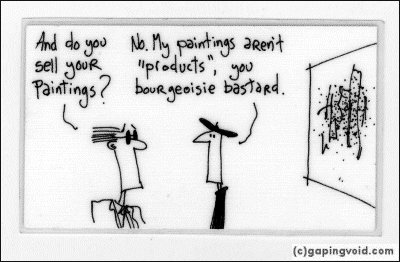
7. Keep your day job.I�m not just saying that for the usual reason i.e. because I think your idea will fail. I�m saying it because to suddenly quit one�s job in a big ol' creative drama-queen moment is always, always, always in direct conflict with what I call "The Sex & Cash Theory".
THE SEX & CASH THEORY: "The creative person basically has two kinds of jobs: One is the sexy, creative kind. Second is the kind that pays the bills. Sometimes the task in hand covers both bases, but not often. This tense duality will always play center stage. It will never be transcended."
A good example is Phil, a NY photographer friend of mine. He does really wild stuff for the indie magazines- it pays nothing, but it allows him to build his portfolio. Then he'll go off and shoot some catalogues for a while. Nothing too exciting, but it pays the bills.
Another example is somebody like Martin Amis. He writes "serious" novels, but he has to supplement his income by writing the occasional newspaper article for the London papers (novel royalties are bloody pathetic- even bestsellers like Amis aren't immune).
Or actors. One year Travolta will be in an ultra-hip flick like Pulp Fiction ("Sex"), the next he'll be in some dumb spy thriller ("Cash").
Or painters. You spend one month painting blue pictures because that's the color the celebrity collectors are buying this season ("Cash"), you spend the next month painting red pictures because secretly you despise the color blue and love the color red ("Sex").
Or geeks. You spend you weekdays writing code for a faceless corporation ("Cash"), then you spend your evening and weekends writing anarchic, weird computer games to amuse your techie friends with ("Sex").
It's balancing the need to make a good living while still maintaining one's creative sovereignty. My M.O. is gapingvoid ("Sex"), coupled with my day job ("Cash").
I'm thinking about the young writer who has to wait tables to pay the bills, in spite of her writing appearing in all the cool and hip magazines.... who dreams of one day of not having her life divided so harshly.
Well, over time the 'harshly' bit might go away, but not the 'divided'.
"This tense duality will always play center stage. It will never be transcended."
As soon as you accept this, I mean really accept this, for some reason your career starts moving ahead faster. I don't know why this happens. It's the people who refuse to cleave their lives this way- who just want to start Day One by quitting their current crappy day job and moving straight on over to best-selling author... Well, they never make it.
Anyway, it's called "The Sex & Cash Theory". Keep it under your pillow.
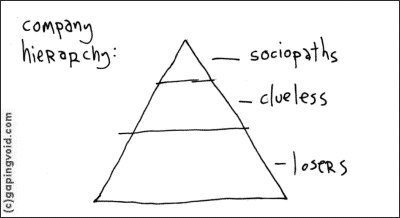
8. Companies that squelch creativity can no longer compete with companies that champion creativity.
Nor can you bully a subordinate into becoming a genius.
Since the modern, scientifically-conceived corporation was invented in the early half of the Twentieth Century, creativity has been sacrificed in favor of forwarding the interests of the "Team Player".
Fair enough. There was more money in doing it that way; that's why they did it.
There's only one problem. Team Players are not very good at creating value on their own. They are not autonomous; they need a team in order to exist.
So now corporations are awash with non-autonomous thinkers.
"I don't know. What do you think?"
"I don't know. What do you think?"
"I don't know. What do you think?"
"I don't know. What do you think?"
"I don't know. What do you think?"
"I don't know. What do you think?"
And so on.
Creating an economically viable entity where lack of original thought is handsomely rewarded creates a rich, fertile environment for parasites to breed. And that's exactly what's been happening. So now we have millions upon millions of human tapeworms thriving in the Western World, making love to their Powerpoint presentations, feasting on the creativity of others.
What happens to an ecology, when the parasite level reaches critical mass?
The ecology dies.
If you're creative, if you can think independantly, if you can articulate passion, if you can override the fear of being wrong, then your company needs you now more than it ever did. And now your company can no longer afford to pretend that isn't the case.
So dust off your horn and start tooting it. Exactly.
However if you're not paricularly creative, then you're in real trouble. And there's no buzzword or "new paradigm" that can help you. They may not have mentioned this in business school, but... people like watching dinosaurs die.
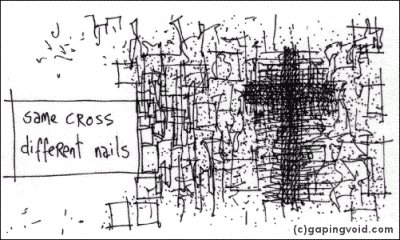
9. Everybody has their own private Mount Everest they were put on this earth to climb.You may never reach the summit; for that you will be forgiven. But if you don't make at least one serious attempt to get above the snow-line, years later you will find yourself lying on your deathbed, and all you will feel is emptiness.
This metaphorical Mount Everest doesn't have to manifest itself as "Art". For some people, yes, it might be a novel or a painting. But Art is just one path up the mountain, one of many. With others the path may be something more prosaic. Making a million dollars, raising a family, owning the most Burger King franchises in the Tri-State area, building some crazy oversized model airplane, the list has no end.
Whatever. Let's talk about you now. Your mountain. Your private Mount Everest. Yes, that one. Exactly.
Let's say you never climb it. Do you have a problem witb that? Can you just say to yourself, "Never mind, I never really wanted it anyway" and take up stamp collecting instead?
Well, you could try. But I wouldn't believe you. I think it's not OK for you never to try to climb it. And I think you agree with me. Otherwise you wouldn't have read this far.
So it looks like you're going to have to climb the frickin' mountain. Deal with it.
My advice? You don't need my advice. You really don't. The biggest piece of advice I could give anyone would be this:
"Admit that your own private Mount Everest exists. That is half the battle."
And you've already done that. You really have. Otherwise, again, you wouldn't have read this far.
Rock on.
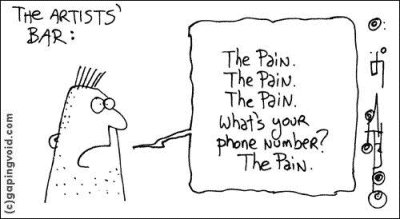
10. The more talented somebody is, the less they need the props.
Meeting a person who wrote a masterpiece on the back of a deli menu would not surprise me. Meeting a person who wrote a masterpiece with a silver Cartier fountain pen on an antique writing table in an airy SoHo loft would SERIOUSLY surprise me.
Abraham Lincoln wrote The Gettysberg Address on a piece of ordinary stationery that he had borrowed from the friend whose house he was staying at.
James Joyce wrote with a simple pencil and notebook. Somebody else did the typing, but only much later.
Van Gough rarely painted with more than six colors on his palette.
I draw on the back of wee biz cards. Whatever.
There's no correlation between creativity and equipment ownership. None. Zilch. Nada.
Actually, as the artist gets more into his thing, and as he gets more successful, his number of tools tends to go down. He knows what works for him. Expending mental energy on stuff wastes time. He's a man on a mission. He's got a deadline. He's got some rich client breathing down his neck. The last thing he wants is to spend 3 weeks learning how to use a router drill if he doesn't need to.
A fancy tool just gives the second-rater one more pillar to hide behind.
Which is why there are so many second-rate art directors with state-of-the-art Macinotsh computers.
Which is why there are so many hack writers with state-of-the-art laptops.
Which is why there are so many crappy photographers with state-of-the-art digital cameras.
Which is why there are so many unremarkable painters with expensive studios in trendy neighborhoods.
Hiding behind pillars, all of them.
Pillars do not help; they hinder. The more mighty the pillar, the more you end up relying on it psychologically, the more it gets in your way.
And this applies to business, as well.
Which is why there are so many failing businesses with fancy offices.
Which is why there's so many failing businessmen spending a fortune on fancy suits and expensive yacht club memberships.
Again, hiding behind pillars.
Successful people, artists and non-artists alike, are very good at spotting pillars. They're very good at doing without them. Even more importantly, once they've spotted a pillar, they're very good at quickly getting rid of it.
Good pillar management is one of the most valuable talents you can have on the planet. If you have it, I envy you. If you don't, I pity you.
Sure, nobody's perfect. We all have our pillars. We seem to need them. You are never going to live a pillar-free existence. Neither am I.
All we can do is keep asking the question, "Is this a pillar" about every aspect of our business, our craft, our reason for being alive etc and go from there. The more we ask, the better we get at spotting pillars, the more quickly the pillars vanish.
Ask. Keep asking. And then ask again. Stop asking and you're dead.
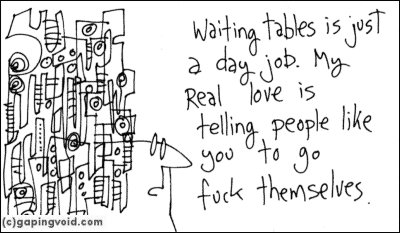
11. Don't try to stand out from the crowd; avoid crowds altogether.
Your plan for getting your work out there has to be as original as the actual work, perhaps even more so. The work has to create a totally new market. There's no point trying to do the same thing as 250,000 other young hopefuls, waiting for a miracle. All existing business models are wrong. Find a new one.
I've seen it so many times. Call him Ted. A young kid in the big city, just off the bus, wanting to be a famous something: artist, writer, musician, film director, whatever. He's full of fire, full of passion, full of ideas. And you meet Ted again five or ten years later, and he's still tending bar at the same restaurant. He's not a kid anymore. But he's still no closer to his dream.
His voice is still as defiant as ever, certainly, but there's an emptiness to his words that wasn't there before.
Yeah, well, Ted probably chose a very well-trodden path. Write novel, be discovered, publish bestseller, sell movie rights, retire rich in 5 years. Or whatever.
No worries that there's probably 3 million other novelists/actors/musicians/painters etc with the same plan. But of course, Ted's special. Of course his fortune will defy the odds eventually. Of course. That's what he keeps telling you, as he refills your glass.
Is your plan of a similar ilk? If it is, then I'd be concerned.
When I started the business card cartoons I was lucky; at the time I had a pretty well-paid corporate job in New York that I liked. The idea of quitting it in order to join the ranks of Bohemia didn't even occur to me. What, leave Manhattan for Brooklyn? Ha. Not bloody likely. I was just doing it to amuse myself in the evenings, to give me something to do at the bar while I waited for my date to show up or whatever.
There was no commerical incentive or larger agenda governing my actions. If I wanted to draw on the back of a business card instead of a "proper" medium, I could. If I wanted to use a four letter word, I could. If I wanted to ditch the standard figurative format and draw psychotic abstractions instead, I could. There was no flashy media or publishing executive to keep happy. And even better, there was no artist-lifestyle archetype to conform to.
It gave me a lot of freedom. That freedom paid off in spades later.
Question how much freedom your path affords you. Be utterly ruthless about it.
It's your freedom that will get you to where you want to go. Blind faith in an over-subscribed, vainglorious myth will only hinder you.
Is you plan unique? Is there nobody else doing it? Then I'd be excited. A little scared, maybe, but excited.
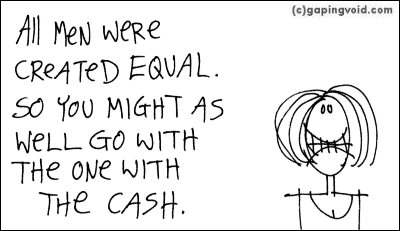
12. If you accept the pain, it cannot hurt you.
The pain of making the necessary sacrifices always hurts more than you think it's going to. I know. It sucks. That being said, doing something seriously creative is one of the most amazing experiences one can have, in this or any other lifetime. If you can pull it off, it's worth it. Even if you don't end up pulling it off, you'll learn many incredible, magical, valuable things. It's NOT doing it when you know you full well you HAD the opportunity- that hurts FAR more than any failure.
Frankly, I think you're better off doing something on the assumption that you will NOT be rewarded for it, that it will NOT receive the recognition it deserves, that it will NOT be worth the time and effort invested in it.
The obvious advantage to this angle is, of course, if anything good comes of it, then it's an added bonus.
The second, more subtle and profound advantage is: that by scuppering all hope of worldly and social betterment from the creative act, you are finally left with only one question to answer:
Do you make this damn thing exist or not?
And once you can answer that truthfully to yourself, the rest is easy.
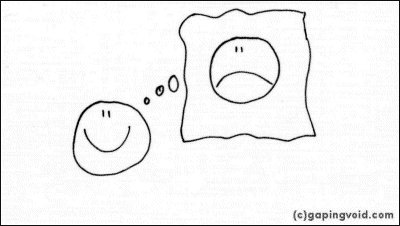
13. Never compare your inside with somebody else's outside.
The more you practice your craft, the less you confuse worldly rewards with spiritual rewards, and vice versa. Even if your path never makes any money or furthers your career, that's still worth a TON.
When I was 16 or 17 in Edinburgh I vaguely knew this guy who owned a shop called "Cinders", on St. Stephen's Street. It specialized in restoring antique fireplaces.
Cinders' modus operandi was very simple. Buy original Georgian and Victorian chimneypieces from old, dilapidated houses for 10 cents on the dollar, give them a loving but expedient makeover in the workshop, sell them at vast profit to yuppies.
Back then I was insatiably curious about how people made a living (I still am). So one-day, while sitting on his stoop I chatted with the fireplace guy about it.
He told me about the finer points of his trade- the hunting through old houses, the craftsmanship, the customer relations, and of course the profit.
The fellow seemed quite proud of his job. From how he described it he seemed to like his trade and be making a decent living. Scotland was going through a bit of a recession at the time; unemployment was high, money was tight; I guess for an ageing hippie things could've been a lot worse.
Very few kids ever said, "Gosh, when I grow up I'm going to be a fireplace guy!" It's not the most obvious trade in the world. I asked him about how he fell into it.
"I used to be an antiques dealer," he said. "People who spend a lot of money on antiques also seem to spend a lot of money restoring their houses. So I sort of got the whiff of opportunity just by talking to people in my antiques shop. Also, there are too many antique dealers in Edinburgh crowding the market, so I was looking for an easier way to make a living."
Like the best jobs in the world, it just kindasorta happened.
"Well, some of the fireplaces are real beauties," I said. "It must be hard parting with them."
"No it isn't," he said (and this is the part I remember most). "I mean, I like them, but because they take up so much room- they're so big and bulky- I'm relieved to be rid of them once they're sold. I just want them out of the shop ASAP and the cash in my pocket. Selling them is easy for me. Unlike antiques. I always loved antiques, so I was always falling in love with the inventory, I always wanted to hang on to my best stuff. I'd always subconsciously price them too high in order to keep them from leaving the shop."
Being young and idealistic, I told him I thought that was quite sad. Why choose to sell a "mere product" (i.e. chimneypieces) when instead you could make your living selling something you really care about (i.e. anitques)? Surely the latter would be a preferable way to work?
"The first rule of business," he said, chuckling at my na�vet�, "is never sell something you love. Otherwise, you may as well be selling your children."
15 years later I'm at a bar in New York. Some friend-of-a-friend is looking at my cartoons. He asks me if I publish. I tell him I don't. Tell him it's just a hobby. Tell him about my advertising job.
"Man, why the hell are you in advertising?" he says, pointing to my portfolio. "You should be doing this. Galleries and shit."
"Advertising's just chimneypieces," I say, speaking into my glass.
"What the fuck?"
"Never mind."
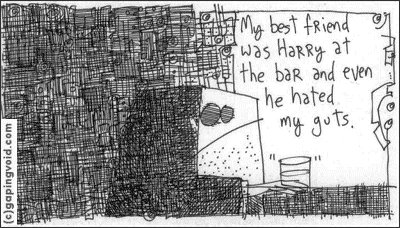
14. Dying young is overrated.
I've seen so many young people take the "Gotta do the drugs & booze thing to make me a better artist" route over the years. A choice that wasn't smart, original, effective, healthy, or ended happily.
It's a familiar story: a kid reads about Charlie Parker or Jimi Hendrix or Charles Bukowski and somehow decides that their poetic but flawed example somehow gives him permission and/or absolution to spend the next decade or two drowning in his own metaphorical vomit.
Of course, the older you get, the more casualties of this foolishness you meet. The more time has had to ravage their lives. The more pathetic they seem. And the less remarkable work they seem to have to show for it, for all their "amazing experiences" and "special insights".
The smarter and more talented the artist is, the less likely he will choose this route. Sure, he might screw around a wee bit while he's young and stupid, but he will move on quicker than most.
But the kid thinks it's all about talent; he thinks it's all about 'potential'. He underestimates how much time, discipline and stamina also play their part. Sure, like Bukowski et al, there are exceptions. But that is why we like their stories when we're young. Because they are exceptional stories. And every kid with a guitar or a pen or a paintbrush or an idea for a new business wants to be exceptional. Every kid underestimates his competition, and overestimates his chances. Every kid is a sucker for the idea that there's a way to make it without having to do the actual hard work.
So the bars of West Hollywood and New York are awash with people throwing their lives away in the desperate hope of finding a shortcut, any shortcut. And a lot of them aren't even young anymore; their B-plans having been washed away by Vodka & Tonics years ago.
Meanwhile their competition is at home, working their asses off.
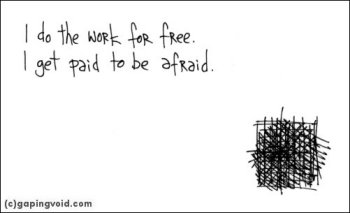
15. The most important thing a creative person can learn professionally is where to draw the red line that separates what you are willing to do, and what you are not.
Art suffers the moment other people start paying for it. The more you need the money, the more people will tell you what to do. The less control you will have. The more bullshit you will have to swallow. The less joy it will bring. Know this and plan accordingly.
Recently I heard Chris Ware, currently one of the top 2 or 3 most critically acclaimed cartoonists on the planet, describe his profession as �unrewarding�.
When the guy at the top of the ladder you�re climbing describes the view from the top as �unrewarding�, be concerned. Heh.
I knew Chris back in college, at The University of Texas. Later, in the early 1990�s I knew him hanging around Wicker Park in Chicago, that famous arty neighbourhood, while he was getting his Masters from The School of The Art Institute, and I was working as a junior copywriter at Leo Burnett. We weren�t that close, but we had mutual friends. He�s a nice guy. Smart as hell.
So I�ve watched him over the years go from talented undergraduate to famous rockstar comic strip guy. Nice to see, certainly- it�s encouraging when people you know get deservedly famous. But also it was really helpful for me to see first-hand the realities of being a professional cartoonist, both good and bad. It�s nice to get a snapshot of reality.
His example really clarified a lot for me about 5-10 years ago when I got to the point where my cartoons got good enough to where I could actually consider doing it professionally. I looked at the market, saw the kind of life Chris and others like him had, saw the people in the business calling the shots, saw the kind of deluded planet most cartoon publishers were living on, and went �Naaaah.�
Thinking about it some more, I think one of the main reasons I stayed in advertising is simply because hearing �change that ad� pisses me off a lot less than �change that cartoon�. Though the compromises one has to make writing ads can often be tremendous, there�s only so much you have to take personally. It�s their product, it�s their money, so it�s easier to maintain healthy boundaries. With cartooning, I invariably found this impossible.
The most important thing a creative person can learn professionally is where to draw the red line that separates what you are willing to do, and what you are not. It is this red line that demarcates your sovereignty; that defines your own private creative domain. What shit you are willing to take, and what shit you�re not. What you are willing to relinquish control over, and what you aren�t. What price you are willing to pay, and what price you aren�t. Everybody is different; everybody has their own red line. Everybody has their own �Sex & Cash Theory�.
When I see somebody �suffering for their art�, it�s usually a case of them not knowing where that red line is, not knowing where the sovereignty lies.
Somehow he thought that sleazy producer wouldn�t make him butcher his film with pointless rewrites, but Alas! Somehow he thought that gallery owner would turn out to be a competent businessman, but Alas! Somehow he thought that publisher would promote his new novel properly, but Alas! Somehow he thought that Venture Capitalist would be less of an asshole about the start-up�s cash flow, but Alas! Somehow he thought that CEO would support his new marketing initiative, but Alas!
Knowing where to draw the red line is like knowing yourself, like knowing who your real friends are. Some are better at it than others. Life is unfair.
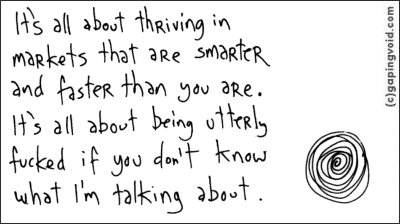
16. The world is changing.
Some people are hip to it, others are not. If you want to be able to afford groceries in 5 years, I'd recommend listening closely to the former and avoiding the latter. Just my two cents.
Your job is probably worth 50% what it was in real terms 10 years ago. And who knows? It may very well not exist in 5-10 years.
We all saw the traditional biz model in my industry, advertising, start going down the tubes 10 years or so ago. Our first reaction was "work harder".
It didn't work. People got shafted in their thousands. It's a cold world out there.
We thought being talented would save our asses. We thought working late and weekends would save our asses. Nope.
We thought the internet and all that Next Big Thing, new media and new technology stuff would save our asses. We thought it would fill in the holes in our ever more intellectually bankrupt solutions we were offering our clients. Nope.
Whatever. Regardless of how the world changes, regardless of what new technologies, business models and social architectures are coming down the pike, the one thing "The New Realities" cannot take away from you is trust.
The people you trust and vice versa, this is what will feed you and pay for your kids' college. Nothing else.
This is true if you're an artist, writer, doctor, techie, lawyer, banker, or bartender.
i.e. Stop worrying about technology. Start worrying about people who trust you.
In order to navigate The New Realities you have to be creative- not just within your particular profession, but in EVERYTHING. Your way of looking at the world will need to become ever more fertile and original. And this isn't just true for artists, writers, techies, Creative Directors and CEOs; this is true for EVERYBODY. Janitors, receptionists and bus drivers, too. The game has just been ratcheted up a notch.
The old ways are dead. And you need people around you who concur.
That means hanging out more with the creative people, the freaks, the real visionaries, than you're already doing. Thinking more about what their needs are, and responding accordingly. It doesn't matter what industry we're talking about- architecture, advertising, petrochemicals- they're around, they're easy enough to find if you make the effort, if you've got something worthwhile to offer in return. Avoid the dullards; avoid the folk who play it safe. They can't help you any more. Their stability model no longer offers that much stability. They are extinct, they are extinction.
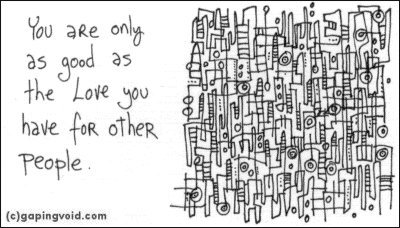
17. Merit can be bought. Passion can't.
The only people who can change the world are people who want to. And not everybody does.
Human beings have this thing I call the "Pissed Off Gene". It's that bit of our psyche that makes us utterly dissatisfied with our lot, no matter how kindly fortune smiles upon us.
It's there for a reason. Back in our early caveman days being pissed off made us more likely to get off our butt, get out of the cave and into the tundra hunting wooly mammoth, so we'd have something to eat for supper. It's a survival mechanism. Damn useful then, damn useful now.
It's this same Pissed Off Gene that makes us want to create anything in the first place- drawings, violin sonatas, meat packing companies, websites. This same gene drove us to discover how to make a fire, the wheel, the bow and arrow, indoor plumbing, the personal computer, the list is endless.
Part of understanding the creative urge is understanding that it's primal. Wanting to change the world is not a noble calling, it's a primal calling.
We think we're "providing a superior integrated logistic system" or "helping America to really taste freshness". In fact we're just pissed off and want to get the hell out of the cave and kill the woolly mammoth.
Your business either lets you go hunt the woolly mammoth or it doesn't. Of course, like so many white-collar jobs these days, you might very well be offered a ton of money to sit in the corner-office cave and pretend that you're hunting. That is sad. What's even sadder is if you agree to take the money.
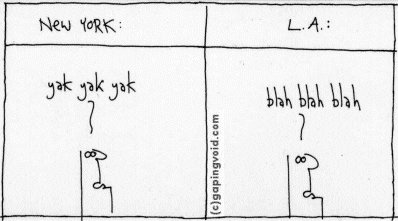
18. Avoid the Watercooler Gang.
They're a well-meaning bunch, but they get in the way eventually.
Back when I worked for a large advertising agency as a young rookie, it used to just bother me how much the "Watercooler Gang" just kvetched all the time. The "Watercooler Gang" was my term for what was still allowed to exist in the industry back then. Packs of second-tier creatives, many years passed their sell-by date, being squeezed by the Creative Directors for every last ounce of juice they had, till it came time to firing them on the cheap. Taking too many trips to the watercooler and coming back drunk from lunch far too often. Working late nights and weekends on all the boring-but-profitable accounts. Squeeze, squeeze, squeeze.
I remember some weeks where one could easily spend half an hour a day, listening to Ted complain.
Ted used to have a window office but now had a cube ever since that one disastrous meeting with Client X. He would come visit me in my cube at least once a day and start his thing. Complain, complain, complain... about whatever- how Josh-The-Golden-Boy was a shit writer and a complete phony... or how they bought Little-Miss-Hot-Pant's ad instead of his, "Even though mine was the best in the room and every bastard there knew it."
Like I said, whatever.
It was endless...Yak Yak Yak... Oi vey! Ted I love ya, you're a great guy but shut the hell up...
In retrospect it was Ted's example that taught me a very poignant lesson- back then I was still too young and naive to have learned it by that point- that your office could be awash with Clio's and One Show awards, yet your career could still be down the sink-hole.
Don't get me wrong- my career there was a complete disaster. This is not a case of one of the Alpha's mocking the Beta's. This is a Gamma mocking the Betas.
I'm having lunch with my associate, John, who's about the same age as me. Cheap and cheerful Thai food, just down the road from the agency.
"I gotta get out of this company," I say.
"I thought you liked your job," says John.
"I do," I say. "But the only reason they like having me around is because I'm still young and cheap. The minute I am no longer either, I'm dead meat."
"Like Ted," says John.
"Yeah� him and the rest of The Watercooler Gang."
"The Watercoolies," laughs John.
So we had a good chuckle about our poor, hapless elders. We weren't that sympathetic, frankly. Their lives might have been hell then, but they had already had their glory moments. They had won their awards, flown off to The Bahamas to shoot toilet paper ads with famous movie stars and all that. Unlike us young'uns. John and I had only been out of college a couple of years and had still yet to make our mark on the industry we had entered with about as much passion and hope as anybody alive.
We had sold a few newspaper ads now and then, some magazine spreads, but the TV stuff was still well beyond reach. So far the agency we had worked for had yet to allow us to shine. Was this our fault or theirs? Maybe a little bit of both, but back then it was all "Their fault, dammit!" Of course, everything is "Their fault, dammit" when you're 24.
I quit my job about a year later. John stayed on with the agency for whatever reason, then about 5 years ago got married, with his first kid following soon after. Suddenly with a family to support he couldn't afford to get fired. The Creative Director knew this and started to squeeze.
"You don't mind working this weekend, John, do you? Good. I knew you wouldn't. We all know how much the team relies on you to deliver at crunch time- that's why we value you so highly, John, wouldn't you say?"
Last time I saw John he was working at this horrible little agency for a fraction of his former salary. Turns out the big agency had tossed him out about a week after his kid's second birthday.
We're sitting there at the Thai restaurant again, having lunch for old time's sake. We're having a good time, talking about the usual artsy-fartsy stuff we always do. It's a great conversation, marred only by the fact that I can't get the word "Watercooler" out of my goddamn head...
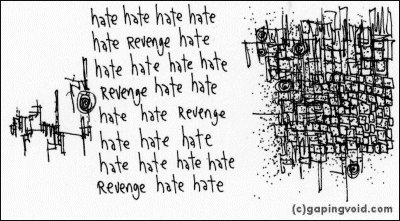
19. Sing in your own voice.
Piccasso was a terrible colorist. Turner couldn't paint human beings worth a damn. Saul Steinberg's formal drafting skills were appalling. TS Eliot had a full-time day job. Henry Miller was a wildly uneven writer. Bob Dylan can't sing or play guitar.
But that didn't stop them, right?
So I guess the next question is, "Why not?"
I have no idea. Why should it?
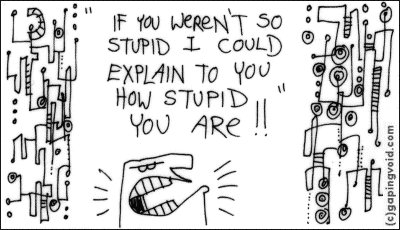
20. The choice of media is irrelevant.
Every media's greatest strength is also its greatest weakness. Every form of media is a set of fundemental compromises, one is not "higher" than the other. A painting doesn't do much, it just sits there on a wall. That's the best and worst thing thing about it. Film combines sound, movement, photography, music, acting. That's the best and worst thing thing about it. Prose just uses words arranged in linear form to get its point across. That's the best and worst thing thing about it etc.
Back in college I was an English Major. I had no aspirations for teaching, writing or academe, it was just a subject I could get consistently high grades in. Plus I liked to read books and write papers, so it worked well enough for me.
Most of my friends were Liberal Arts Majors, but there the similarity ended. We never really went to class together. I dunno, we'd meet up in the evenings and weekends, but I never really socialized with people in my classes that much.
So it was always surprising to me to meet the Art Majors: fine arts, film, drama, architecture etc. They seemed to live in each other's pockets. They all seemed to work, eat and sleep together. Lots of bonding going on. Lots of collaboration. Lots of incestuousness. Lots of speeches about the sanctity of their craft.
Well, a cartoon only needs one person to make it. Same with a piece of writing. No Big Group Hug required. So all this sex-fuelled socialism was rather alien to me, even if parts of it seemed very appealing.
During my second year at college I started getting my cartoons published, and not just the school paper. Suddenly I found meeting girls easy. I was very happy about that, I can assure you, but life carried on pretty much the same.
I suppose my friends thought the cartooning gigs were neat or whatever, but it wasn't really anything that affected our friendship. It was just something I did on the side, the way other people restored old cars or or kept a darkroom for their camera.
My M.O. was and still is to just have a normal life, be a regular schmoe, with a terrific hobby on the side. It's not exactly rocket science.
This attitude seemed kinda alien to the Art Majors I met. Their chosen art form seemed more like a religion to them. It was serious. It was important. It was a big part of their identity, and it almost seemed to them that humanity's very existence totally depended on them being able to pursue their dream as a handsomely rewarded profession etc.
Don't get me wrong, I knew some Art Majors who were absolutely brilliant. One or two of them are famous now. And I can see if you've got a special talent, how the need to seriously pursue it becomes important.
But looking back, I also see a lot of screwy kids who married themselves to their medium of choice for the wrong reasons. Not because they had anything particularly unique of visionary to say, but because it was cool. Because it was sexy. Because it was hip. Because it gave them something to talk about at parties. Because it was easier than thinking about getting a real job after graduation.
I'm in two minds about this. One part of me thinks it's good for kids to mess around with insanely high ambitions, and maybe one or two of them will make it, maybe one or two will survive the cull. That's what's being young is all about, and I think it's wonderful.
The other side of me wants to tell these kids to beware of choosing difficult art forms for the wrong reasons. You can wing it while you're young, but it's not till your youth is over that The Devil starts seeking out his due. And that's never pretty. I've seen it happen more than once to some very dear, sweet people, and it's really heartbreaking to watch.
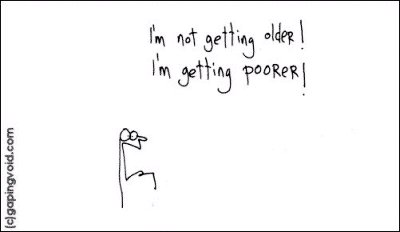
21. Selling out is harder than it looks.
Diluting your product to make it more "commercial" will just make people like it less.
Many years ago, barely out of college, I started schlepping around the ad agencies, looking for my first job.
One fine day a Creative Director kindly agreed for me to come show him my portfolio. Hooray!
So I came to his office and showed him my work. My work was bloody awful. All of it.
Imagine the worst, cheesiest "I used to wash with Sudso but now I wash with Lemon-Fresh Rinso Extreme" vapid housewife crap. Only far worse than that.
The CD was a nice guy. You could tell he didn't think much of my work, though he was far too polite to blurt it out. Finally he quietly confessed that it wasn't doing much for him.
"Well, the target market are middle class houswives," I rambled. "They're quite conservative, so I thought I'd better tone it down..."
"You can tone it down once you've gotten the job and once the client comes after your ass with a red hot poker and tells you to tone it down," he laughed. "Till then, show me the toned-up version."
This story doesn't just happen in advertising. It happens everywhere.

22. Nobody cares. Do it for yourself.
Everybody is too busy with their own lives to give a damn about your book, painting, screenplay etc, especially if you haven't sold it yet. And the ones that aren't, you don't want in your life anyway.
Making a big deal over your creative schtick is the kiss of death. That's all I have to say on the subject.
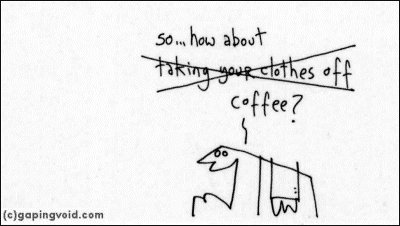
23. Worrying about "Commercial vs. Artistic" is a complete waste of time.
You can argue about "Selling Out" versus "Artistic Purity" till the cows come home. They were kvetching about it in 1950, they'll be kvetching about it in 2050.
Vigorous debates about Commericialism in Art is a path well-trodden, and not a place where one is going to come up with many new, earth-shattering insights.
But a lot of people like to dwell on it because it keeps them from having to ever journey into unknown territory. It's safe. It allows you to have strong emotions and opinions without any real risk to yourself. Without you having to do any of the actual hard work involved in the making and selling of something you believe in.
To me, it's not about whether Tom Clancy sells truckloads of books or a Nobel Prize Winner sells didly-squat. Those are just ciphers, external distractions. To me, it's about what YOU are going to do with the short time you have left on this earth. Different criteria altogether.
Frankly, how a person nurtures and develops his or her own "creative sovereignty", with or without the help of the world at large, is in my opinion a much more interesting subject.
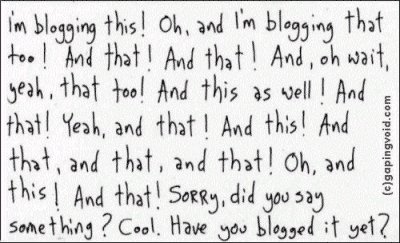
24. Don't worry about finding inspiration. It comes eventually.
Inspiration precedes the desire to create, not the other way around.
One of the reasons I got into drawing cartoons on the back of business cards was I could carry them around with me. Living downtown, you spend a lot of time walking around the place. I wanted an art form that was perfect for that.
So if I was walking down the street and I suddenly got hit with the itch to draw something, I could just nip over to the nearest park bench or coffee shop, pull out a blank card from my bag and get busy doing my thing. Seamless. Effortless. No fuss. I like it.
Before, when I was doing larger works, every time I got an idea while walking down the street I'd have to quit what I was doing and schlep back to my studio while the inspiration was still buzzing around in my head. Nine times out of ten the inspired moment would have past by the time I got back, rendering the whole exercise futile. Sure, I'd get drawing anyway, but it always seemed I was drawing a memory, not something happening at that very moment.
If you're arranging your life in such a way that you need to make a lot of fuss between feeling the itch and getting to work, you�re putting the cart before the horse. You�re probably creating a lot of counterproductive 'Me, The Artist, I must create, I must leave something to posterity' melodrama. Not interesting for you or for anyone else.
You have to find a way of working that makes it dead easy to take full advantage of your inspired moments. They never hit at a convenient time, nor do they last long.
Conversely, neither should you fret too much about "writer's block", "artist's block" or whatever. If you're looking at a blank piece of paper and nothing comes to you, then go do something else. Writer's block is just a symptom of feeling like you have nothing to say, combined with the rather weird idea that you SHOULD feel the need to say something.
Why? If you have something to say, then say it. If not, enjoy the silence while it lasts. The noise will return soon enough. In the meantime, you're better off going out into the big, wide world, having some adventures and refilling your well. Trying to create when you don't feel like it is like making conversation for the sake of making conversation. It's not really connecting, it's just droning on like an old, drunken barfly.
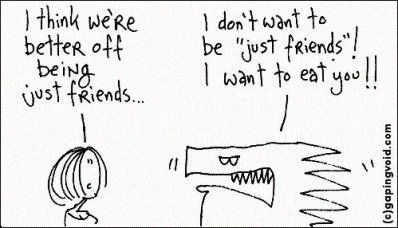
More thoughts on "How To Be Creative":
25. You have to find your own schtick.
A Picasso always looks like Piccasso painted it. Hemingway always sounds like Hemingway. A Beethoven Symphony always sounds like a Beethoven's Syynphony. Part of being a Master is learning how to sing in nobody else's voice but your own.
Every artist is looking for their big, definitive "Ah-Ha!" moment, whether they're a Master or not.
That moment where they finally find their true voice, once and for all.
For me, it was when I discovered drawing on the back of business cards.
Other, more famous and notable examples would be Jackson Pollack discovering splatter paint. Or Robert Ryman discovering all-white canvases. Andy Warhol discovering silkscreen. Hunter S. Thompson discovering Gonzo Journalism. Duchamp discovering the Found Object. Jasper Johns discovering the American Flag. Hemingway discovering brevity. James Joyce discovering stream-of-conciousness prose.
Was it luck? Perhaps a little bit.
But it wasn't the format that made the art great. It was the fact that somehow while playing around with something new, suddenly they found themselves able to put their entire selves into it.
Only then did it become their 'schtick', their true voice etc.
That's what people responded to. The humanity, not the form. The voice, not the form.
Put your whole self into it, and you will find your true voice. Hold back and you won't. It's that simple.

26. Write from the heart.
There is no silver bullet. There is only the love God gave you.
As a professional writer, I am interested in how conversation scales.
How communication scales, x to the power of n etc etc.
Ideally, if you're in the communication business, you want to say the same thing, the same way to an audience of millions that you would to an audience of one. Imagine the power you'd have if you could pull it off.
But sadly, it doesn't work that way.
You can't love a crowd the same way you can love a person.
And a crowd can't love you the way a single person can love you.
Intimacy doesn't scale. Not really. Intimacy is a one-on-one phenomenon.
It's not a big deal. Whether you�re writing to an audience of one, five, a thousand, a million, ten million, there�s really only one way to really connect. One way that actually works:
Write from the heart.
There is no silver bullet. There is only the love God gave you.
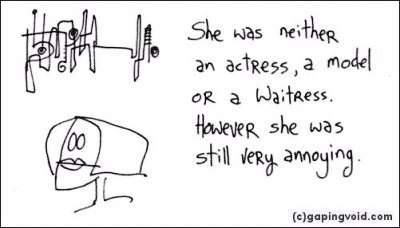
27. The best way to get approval is not to need it.
This is equally true in art and business. And love. And sex. And just about everything else worth having.
About 15 years ago I was hanging out in the offices of Punch, the famous London humor magazine. I was just a kid at the time, for some reason the cartoon editor (who was a famous cartoonist in his own right) was tolerating having me around that day.
I was asking him questions about the biz. He was answering them as best he could while he sorted through a large stack of mail.
"Take a look at this, Sunshine," he said, handing a piece of paper over to me.
I gave it a look. Some cartoonist whose name I recognised had written him a rather sad and desperate letter, begging to be published.
"Another whiney letter from another whiney cartoonist who used to be famous 20 years ago," he said, rolling his eyeballs. "I get at least fifty of them a week from other whiney formerly-famous cartoonists."
He paused. Then he smiled an wicked grin.
"How not to get published," he said. "Write me a frickin' letter like that one."

28. Power is never given. Power is taken.
People who are "ready" give off a different vibe than people who aren't. Animals can smell fear; maybe that's it.
The minute you become ready is the the minute you stop dreaming. Suddenly it's no longer about "becoming". Suddenly it's about "doing".
You don't get the dream job because you walk into the editor's office for the first time and go, "Hi, I would really love to be a sports writer one day, please."
You get the job because you walk into the editor's office and go, "Hi, I'm the best frickin' sports writer on the planet." And somehow the editor can tell you aren't lying, either.
You didn't go in there, asking the editor to give you power. You went in there and politely informed the editor that you already have the power. That's what being "ready" means. That's what "taking power" means.
Not needing anything from another person in order to be the best in the world.
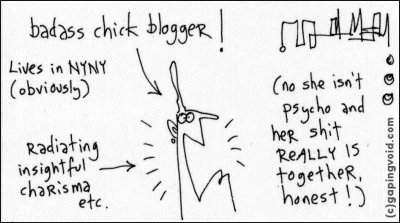
29. Whatever choice you make, The Devil gets his due eventually.
Selling out to Hollywood comes with a price. So does not selling out. Either way, you pay in full, and yes, it invariably hurts like hell.
People are fond of spouting out the old cliche about how Van Gogh never sold a painting in his lifetime. Somehow his example serves to justify to us, decades later, that there is somehow merit in utter failure.
Perhaps, but the man did commit suicide. The market for his work took off big-time shortly after his death. Had he decided to stick around another few decades he most likely would've entered old age quite prosperous. And sadly for failures everywhere, the cliche would have lost a lot of its power.
The fact is, the old cliches work for us in abstract terms, but they never work out in real life quite the same way. Life is messy; cliches are clean and tidy.
Of course, there is no one "true way". Whether you follow the example of fame-and-glamor Warhol or poor-and-miserable Van Gogh doesn't matter in absolute terms. Either extreme may raise you to the highest heights or utterly destroy you. I don't know the answer, nor does anybody else. Nobody but you and God knows why you were put on this Earth, and even then...
So when a young person asks me whether it's better to sell out or stick to one's guns, I never know what to answer. Warhol sold out shamelessly after 1968 (the year he was wounded by the gunshot of a would-be assassin) and did OK by it. I know some great artists who stuck to their guns, and all it did was make them seem more and more pathetic.
Anyone can be an idealist. Anyone can be a cynic. The hard part lies somewhere in the middle i.e. being human.
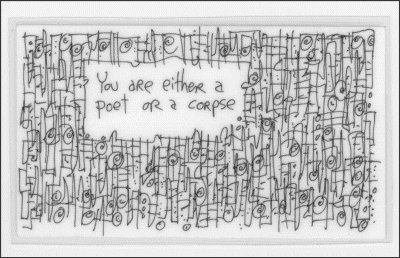
30. The hardest part of being creative is getting used to it.If you have the creative urge, it isn't going to go away. But sometimes it takes a while before you accept the fact.
Back in 1989, I was living in West London, house-sitting a family member's lovely little flat over the summer. In the flat above lived the film director, Tim Burton who was in town for a couple of months, while he was filming "Batman, The Movie".
We got to know each other on-and-off quite well that year. We weren't that close or anything, but we saw each other around a lot. He was a pretty good neighbor, I tried to be the same.
At the time I was in my last year of college, studying to go into advertising as a copywriter. One night he and his then wife came over for dinner.
Somewhere along the line the subject of my career choice came up. Back then I was a bit apprehensive about doing the "creative" thing for a living... in my family people always had "real" jobs in corporations and banks etc, and the idea of breaking with tradition made me pretty nervous.
"Well," said Tim, "if you have the creative bug, it isn't ever going to go away. I'd just get used to the idea of dealing with it."
It was damn good advice. It still is.

31. Remain Frugal. The less you can live on, the more chance your idea will succeed. This is true even after you've "made it".
In 1997, I landed the dream job. High-paid advertising copywriter. Big office. Big apartment in New York. Glamorous parties and glamorous backdrop. All feeding the urban sophisticate narrative etc. All good.
The trouble was, even though I was being paid very well, I was still broke by the end of the month. Life is New York was expensive, and I was determined to experience it fully. I sure as hell wasn't saving anything.
Like they say, education is expensive. And I ended up paying top dollar.
Because of course, one day the recession hit, the job dried up and I nearly found myself on the street. Had I lived a bit more modestly I would have been able to weather the storm better.
There are a lot of people out there who, like me back in New York, make a lot of money, but spend it just as quickly. The older you get, the less you envy them. Sure, they get to go to the fancy restaurants five days a week, but they pay heavily for the privilege. They can't afford to tell their bosses to go take a hike. They can't afford to not panic, when business slows down for a month or two.
Part of being creative is learning how to protect your freedom. That includes freedom from avarice.

32. Allow your work to age with you.
You become older faster than you think. Be ready for it when it happens.
I have a friend. Call him Dan.
When I first met Dan, he was a twenty-eight year old aspiring filmmaker, in a one-bedroom apartment down on New York's Lower East Side, who liked to spend too much time in bars.
The last time I saw him, he was a forty-one year old aspiring filmmaker, in a one-bedroom apartment down on New York's Lower East Side, who likes to spend too much time in bars.
There's a famous old quip: "A lot of people in business say they have twenty years experience, when in fact all the really have is one year's experience, repeated twenty times."
It's not just guys in business who fall into this trap, unfortunately. It happens just as often to people taking a less conventional path. It's sad enough when you see it happen to a friend of yours. When it happens to you, it's even worse.
The good news is, it's easy enough to avoid. Especially with experience. Suddenly you realize that you're just not into the same things you once were. You used to be into staying up late all night, going to parties, now you'd rather stay in and read a book. Sure, it sounds boring, but hey, sometimes "boring" can be a lot of fun. Especially if it's on your own terms.
Just go with the flow and don't worry about it. ESPECIALLY don't worry about the people who ARE worrying about it. They'll just slow you down.

33. Being Poor Sucks.
The biggest mistake young people make is, underestimating how competitive the world is out there.
Everyone will have had a group of friends who went hitchhiking around Europe when they were nineteen, living off ten dollars a day. And they were so happy! And they had so much fun! And money wasn't an issue!
Ha. That was youth, that was not reality. Reality is much bigger than youth. And not as nice.
That's not to say cash is the be-all-and-end-all. But to deny the importance of the material world around you [and its hard currencies] is to detach yourself from reality. And the world WILL punish you hard eventually for that.
I've often been asked by young people, which do I think is a better career choice: "Creativity" or "Money"? I say both are the wrong answer. The best thing to be in this world is an effective human being. Sometimes that requires money, sometimes it doesn't. Be ready for both when it happens.

34. Beware of turning hobbies into jobs.
It sounds great, but there is a downside.
The late billionaire, James Goldsmith once quipped, "When a man marries his mistress, he immediately creates a vacancy."
What's true in philanderers, is also true in life.
When I was about nineteen I knew this guy called Andrew, who was a junior accountant, a few years out of college.
Andrew didn't really like being an accountant, at least, that's what he was fond of saying. His passion, of all things, was antique silverware. In particular, antique silver cutlery. In particular, antique silver teaspoons.
He knew A LOT about antique silver teaspoons. He collected them en masse. He lived and breathed them. OK, maybe that's a pretty strange hobby, but hey, he was pretty much a national authority on them.
To make a long story short, eventually he quit his accountancy gig and got a new job as at a very prestigious auction house, specializing in valuing silverware.
I remember buying him a drink and congratulating him. What happy news!
A few years later, I was hanging out at the same bar with some mutual acquaintances, and his name came up in conversation. This time the news wasn't so happy.
Apparently he had recently lost his job. Apparently he had gone into rehab for alcoholism.
What a bloody shame.
"That's why you should never turn your hobby into your job," said one of my friends, someone far older and wiser than me. "Before, this man had a job and a hobby. Now suddenly, he's just got the job, but no hobby anymore. But a man needs both, you see. And now what does this man, who's always had a hobby, do with his time?
My friend held up his glass.
"Answer: Drink."
Make of that what you will.

35. Savor obscurity while it lasts.
Once you "make it", your work is never the same.
It's a familiar story, re-told countless times. A talented person creates something amazing and wonderful when she's young, poor, hungry and alone, and the world doesn't care. Then one day something happens and her luck is changed forever. Next thing you know she's some sort of celebrity, making all sorts of obscene sums, hanging out with royalty and movie stars. It's a dream a lot of young artists have, something to sustain them during their early, lean years etc.
The funny thing is, when you hear the "rock stars" talk about their climb to the top, the part they invariably speak fondest of, is not the part with all the fame, money and parties. It's the part BEFORE they made it, back when they were living in a basement without electricity and "eating dog food", back when they were doing their breakthrough work.
Back when they were young, and inventing a new language to speak to the world with. More importantly, back when they were young, and inventing a new language other people could also speak to the world with.
Some years ago, after he'd been playing stadiums for a while, the rock singer, Neil Young was booed off stage by his fans when he tried playing new Country & Western material. They didn't want to share his in new adventures. No, they had paid their money to hear the classic rock, dammit. "Down By The River" and "Heart Of Gold", dammit. And if they didn't get it, dammit, they' d be out for blood. As events proved.
It's hard to invent a new language when a lot of people are already heavily invested in your work [including yourself]. When a lot of people are already fluent in the language you're currently speaking with, and they don't want anything new from you. Like the Neil Young fans, they don't want to see your metaphorical new movie, they just want to watch the sequel to the old one.
And success needs lots of people to keep the show on the road. When it's just you, a dream, and a few cans of dog food, there's only one person to worry about. But when the dream turns into reality, there's all sorts of other people suddenly needing taken care of, in order to keep the engine running. Publishers, investors, managers, journalists, retailers, suppliers, groupies, employees, accountants, family members... and the paying customers. They all have a stake your act, and they all want a piece of the action.
So you crank out another sequel and wait for the money to roll in. It's a living.
Of course, one reason the rock stars can speak of their basement-and-dog-food era so fondly is because it eventually came to a end; it didn't last forever. And with all the world tours and parties, this era of creating their seminal work soon became a distant memory. So quite naturally, they miss it. But if they were still "eating dog food" after a few decades, I doubt if they'd be waxing so lyrically.
But as long as you can progress from it eventually, it's a time to be savored. A time when your work is still new to you, a time when the world doesn't need to be fed, like a voracious animal.
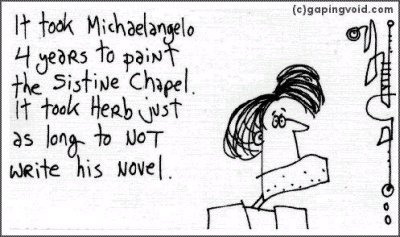
36. Start blogging.
The ease with which a blog can circumvent the gatekeepers is staggering.
How To Get Published In France
I have a friend in Paris. Call her Chantal. She's a lovely woman, tres chic, very smart and sexy, with a cute apartment in the 20th Arrondissement and a respectable job in an advertising agency. A couple of years ago, she wrote a book. A novel. In French. Lots of sex and introspection [Sex & Introspection being a very popular French literary combo, of course]. Anyway, Chantal wants to get the book published.
The last time I dined with her in Paris, Chantal was telling me her tale of woe, after she had spent many long months schlepping around town, trying to find a publisher, which in Paris means trying to ingratiate herself with the Parisian literary scene. This is something that's actually quite hard to break into, given the huge numbers of unpublished sex-and-introspection novels doing the rounds. One guy, an editor at some small imprint nobody outside of Paris has ever heard of, offered to help her, but eventually gave up once he figured out that she wasn't going to sleep with him. You get the picture.
Being an avid blogger, of course, I was not very helpful.
"Your book has thirteen chapters," I say. "Voila! That's thirteen blog posts. One chapter per blog post. Put it online, and you'll have a book offer within six months. Trust me."
Of course, this is not how you do it in Paris, supposedly. You do it by going to all the right parties and hobnobbing with all the right people, supposedly. If you're good at it, you get a book deal, supposedly. If you're really good at it, they'll also let you go on the highbrow TV talk show circuit and pontificate about "Couture" with all the other erudite culture vultures, supposedly. Maybe give you an occasional column in Le Figaro, supposedly. An intoxicating combo of both intellectual celebrity and bourgeoise respectability, supposedly. Very elite, supposedly. Very French, supposedly.
Sadly, she never went with the blog option. Sure, it could've worked quite easily [Hey, it worked easily enough for Tom Reynolds, the London ambulance driver who got a book deal based on his blog writings], but doing that would probably have been seen as a bit gauche by the other groovy cats in the Parisian literary scene. And I suspect she wanted membership into that club, every bit as much as she wanted to see her name in print.
Of course, as anybody who listens to NPR or the BBC will know, we have similar culturally elite hierarchies here in the English-speaking world, just maybe not so hardcore. There's something strangely curious about how the idea of "The Novel", "Le Roman" has such a strong hold on the French imagination; there's something so heroic to them about the idea of the "Auteur", that it's hard to explain to people from more philistine parts of the world. On one level, you can easily admire such a strong reverence to a classic art form. On another level, such attachment can needlessly hold you back.
Whatever. If I were Chantal, I would still reconsider blogging the book in full. And I would post up an English version as well, to give the book the greatest chance of being read by people outside her French, urban microcosm. Sure, the Parisian literary purists will bitch and moan, but hey, they're Parisian literary purists- they're going to bitch and moan anyway.

37. Meaning Scales, People Don't.
From my blog: "Meaning Scales". February, 2005:
As Buddha says, there is no one road to Nirvana. Enlightenment is a house with 6 billion doors. While we're alive, we intend not to find THE DOOR, not A DOOR, but to find OUR OWN, UNIQUE DOOR.
And we're willing to pay for the privilege. We're willing to give up money and time and power and sex and status and certainty and comfort in order to find it.
And guess what? It'll be a great door. It'll add to this life. It'll resonate. Not just with us, but with everybody it comes in contact with. The door will useful and productive. Alive and kicking. It'll create wealth and laughter and joy. It'll pull its own weight, it'll give back to others. It'll be centered on compassion, but will be intolerant of dullards, parasites and cynics.
It may be modest, it may not. It could be a little candle shop; it could be a software company with the GNP of Sweden. It could involve politics or working with the elderly. It could be starting a design studio or opening a bar with Cousin Mike. It could be a screenplay, oil paints, or discovering the violin. It doesn't matter. Meaning Scales.
Sure, I was pretty high on the Kool-Ade when I wrote that, but I think the main point is still valid. The size of the endeavor doesn't matter as much as how meaningful it becomes to you.
But given a choice between two paths, both valid, how do you know which one to take? How do you know which one has the meaningful payoff?
The answer, of course, is that you don't. Whether we're talking about moving to New York to become an "art star", or opening up a humble candle shop in Alpine, Texas, that's why they're called "adventures". Because you don't how it's going to end.
All you can do is admit to yourself that yes, this is an adventure, and to accept it as such, surprises and all. With a little bit of practice you eventually get into the flow of it.
Yes, anything worth doing takes lots of practice. Adventures included.
And when I say "People don't scale", I'm stating the obvious: that no matter how meteoric your rise to the top [or not], you are still beholden to the day-to-day realities as any living creature.
Birth, sickness, death, falling in love, watching TV, raising families, mowing the lawn, going to the movies, taking your nephew to a ball game, drinking beer, hanging out with your buddies, playing frisbee, painting the house. No matter where your adventure takes you, most of what is truly meaningful is still to be found revolving around the mundane stuff you did before you embarked on your adventure. The stuff that'll be going long after you and I are both dead, long after our contribution to the world is forgotten.
But often, one needs to have that big adventure before really understanding this. Going full circle. Exactly.

38. When your dreams become reality, they are no longer your dreams.
If you are successful, it'll never come from the direction you predicted. Same is true if you fail.
[A Brief History Of The "Cartoons Drawn On The Back Of Business Cards" Format.]
As this book reaches its end, I'm thinking how it's been OVER TEN YEARS since I first came up with the "cartoons drawn on the back of business cards" format. And it seems like I'VE ONLY JUST got them to the commercially successful level I thought they were capable of reaching.
Better late than never, I suppose.
A friend asked me recently, had I known it would take this long, would I have bothered in the first place? I have in my mind this fantasy version of myself that makes reasonable and sensible decisions, more often than not. This reasonable and sensible person, if he existed, would probably have answered, "No. Definitely not."
But none of this is sensible. None of it ever was. So yeah, knowing what I know now, I probably wouldn't have behaved any differently. I'm not proud of that; I'm not ashamed, either. It just is.
Was it worth the cost? Not really. It never is. Van Gough once told his brother, "No painting ever sells for as much as it cost the artist to make it." I've yet to meet in the flesh any artist who could prove him wrong.
Though looking on the bright side, it IS nice after years of struggling away in obscurity, to have a body of work that you're actually proud of, one that [A] makes you a good living, [B] exceeds your earlier expectations of what you thought you were capable of achieving as a human being, and perhaps most importantly, [C] has given a lot of other people a lot of joy and value.
When I was a kid in college, there very few avenues a cartoonist could take, if she wished to be successful. There was no internet. There were only newspapers, magazines, books, TV, movies, comic books, merchandising, and little else. A world I find hard to imagine now, only a couple of short decades later. And besides, I never saw my work as particularly commercial, so even if I did give it my best shot, I never thought it would ever realistically pay off.
So in my last year of college, feigning maturity, I turned my attention to landing a job that would pay my bills upon graduation. From what I could then tell, writing TV commercials seemed to use the same part of the brain it took to draw cartoons, and I wasn't a bad cartoonist, so I decided to give Madison Avenue a go. It looked like it could be interesting.
Somehow I managed to get a job as an advertising copywriter, straight out of school. Some skill was needed, most of it was luck, but when you're in your early twenties and entering the serious job market for the first time, you'll take whatever you can get.
Though I was in the ad industry off-and-on for over a decade, I don't think about it too much, now. Some part of me has blacked it out. Besides being VERY hard work, it wasn't much fun. I was very much in the ranks of what I would call the "In-Betweenies" i.e. those good enough to get and keep a pretty well-paid position in an ad agency, but not good enough to really get ahead in it; not good enough to enjoy it properly. This was the world I lived in, in 1998 New York, when I started drawing the cartoons with a vengeance. And like every other In-Betweenie my age, it was a tiring, stressful time for me.
[And then the internet happened...]
Over the next couple of years, yes, I drew a lot of cartoons, but I didn't do much with them. They were just a hobby. Besides, I had a lot going on at the time, with the job and the New York lifestyle to maintain. Most of my cartoon audience back then consisted of fellow New York barflies that I had foisted them upon.
But all good things must come to an end. One day I found myself under-employed, broke and pissed off with life in general. With nothing better to do besides waiting for the phone to ring, in May, 2001 I started my blog, gapingvoid.com.
I would like to say that the website took off soon after, the cartoons were a smash hit, and things improved dramatically right away, but sadly that didn't happen. I just kept at it, day after day, building it up slowly. That's still how it happens, for the most part.
The million-dollar contract has yet to arrive in the mail. That's OK, somewhere along the line I figured how to make good money off of them, INDIRECTLY.
How? It's pretty straightforward, in retrospect. I posted the cartoons online, and because I had a lot of free time on my hands, I then spent a log time tracking what happened to them, once they went out into the ether. This was 2002, just as blogs were beginning to hit the scene. This was the beginning of Google's rise to the top of the search market. This was the era of Technorati.com, when people wanted to start seeing what was happening on the web RIGHT NOW, not just historically.
Over the next year or two watching the cartoons traveling about, watching what other bloggers were up to, I started getting a pretty good feel for how the internet ACTUALLY worked, not just how the journalists and marketing folk told people how it worked. After a while I started posting my thoughts about this brave new world online. And after a while people started e-mailing me, offering to pay me good money if I would share more of what I had learned online with them.
Sharing this information for me was A LOT MORE FUN and better paid than trying to sell ads to clients, so hey, I went for it.
So far I've managed to turn it into a pretty nice business. A lot more money, for a lot let stress and time than Madison Avenue ever offered me. Not a bad outcome.
The thing is, none of it happened on purpose. It just kinda sorta happened, one random event at a time.
I find having two strings to my bow, cartoons and internet, helps the business out a lot. I like to play them off each other. Sorry, I can't draw you a cartoon; I'm too busy doing internet stuff. Sorry, I can't help you with your internet problem; I'm too busy drawing something for a client. I totally believe that if I gave one of them up for good, the other one would crash and burn overnight. It's keeping the creative tension between the two, an extension of the aforementioned "Sex & Cash Theory", that keeps things interesting. For both me and the good folk paying my bills.
I never intended to be a professional cartoonist. I never intended to become an internet jockey. But somehow the two got mashed up to create this third thing. That's what I mean by "If you are successful, it'll never come from the direction you predicted."
It's good to be young and full of dreams. Dreams of one day doing something "insanely great". Dreams of love, beauty, achievement and contribution. But understand they have a life of their own, and they're not very good at following instructions. Love them, revere them, nurture them, respect them, but don't ever become a slave to them. Otherwise you'll kill them off prematurely, before they get the chance to come true.
Good luck.
